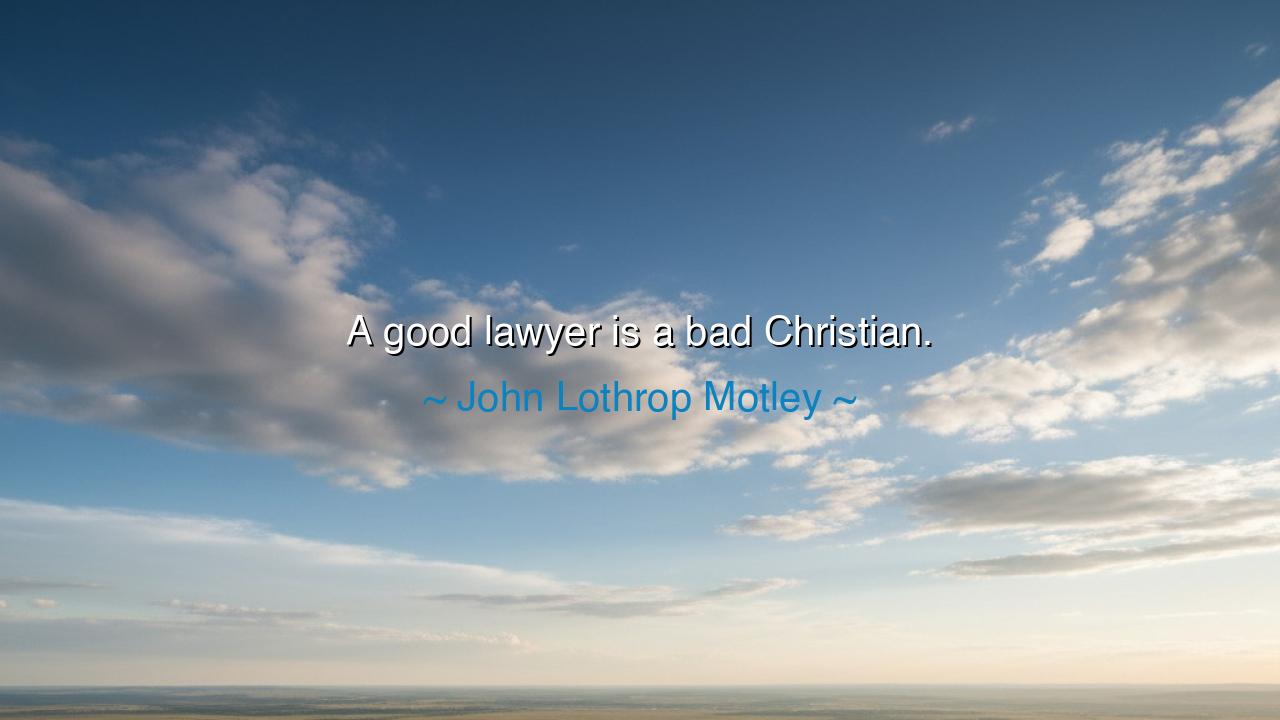
A good lawyer is a bad Christian.






The words of John Lothrop Motley, “A good lawyer is a bad Christian,” fall upon the ear like a riddle, sharp and unsettling, yet brimming with truth. They reveal the eternal tension between the ways of the world and the ways of the spirit, between the sharp cunning demanded by law and the tender mercy commanded by faith. To be a good lawyer often means to argue with precision, to defend even the guilty, to use every weapon of rhetoric and loophole to secure victory. But to be a good Christian demands humility, honesty, forgiveness, and love of neighbor above personal triumph. Motley’s words do not condemn all lawyers, but they expose the difficulty of reconciling worldly success in law with the higher call of faith.
The origin of this saying rests in Motley’s reflections as a historian and diplomat of the nineteenth century, a man who studied not only battles of armies but the battles of courts and conscience. He saw how the courtroom, with its contests of wit and subtlety, often rewarded those who bent truth for advantage. To be a skilled advocate was to know how to shade, twist, or conceal—without lying outright, yet without offering the full light of truth. In such practices, he discerned a clash with the gospel of Christ, which bids men to speak plainly, to let their yes be yes and their no be no. Thus Motley declared, with sorrowful irony, that a lawyer excellent in his craft might stand in peril of his soul.
History itself gives flesh to this tension. Consider the trial of Jesus of Nazareth. The lawyers and priests of his day sought witnesses, twisted words, and manipulated the letter of the law to condemn him, though they knew no true guilt lay upon him. Their mastery of legal forms was unmatched, yet their hearts were far from justice. They were “good lawyers” by the standards of the court, but “bad servants” in the eyes of God. This ancient story is the perfect mirror of Motley’s warning: that law without conscience is a sword wielded against truth itself.
Yet his words do not leave us in despair. They awaken us to vigilance. The craft of law, like any tool, can be bent to serve good or ill. It is not law itself that corrupts, but the temptation to prize victory above righteousness. A lawyer may defend the innocent, uphold the poor, and strike down the corrupt. But to do so while remaining faithful demands extraordinary integrity, for the temptation of pride and cunning is great. In this sense, Motley’s saying is less a condemnation than a challenge: to strive for harmony where most men surrender to division.
The deeper meaning is this: Christianity calls for selflessness, while law rewards cleverness and victory. Christianity esteems mercy, while law esteems judgment. Christianity calls us to confess fault, while law trains us to conceal weakness. To walk both paths requires courage beyond measure. Most who excel in one fall short in the other. Thus the quote is both a warning and a mirror, urging the faithful to weigh their motives and methods carefully.
The lesson for us is clear: in our lives, whether or not we are lawyers, we must guard against the temptation to value victory above virtue. We must not excuse dishonesty in the name of cleverness, nor allow ambition to outweigh compassion. If you must argue, argue with truth. If you must defend, defend with justice. And if you must win, let it be without sacrificing the higher call of mercy and integrity. The clever tongue may win the case, but it may lose the soul.
Therefore, let us live by this wisdom: do not let the practices of the world corrupt the purity of the spirit. Strive to be both skilled in your work and steadfast in your faith. And when forced to choose, choose always truth over triumph, justice over advantage, mercy over cunning. For in the end, the court of heaven is higher than the courts of men, and its judgment will not be swayed by argument but by righteousness.
So let Motley’s words echo as a timeless teaching: “A good lawyer is a bad Christian.” They are not a decree against the profession of law, but a solemn reminder that no craft, however noble, must outweigh the call of conscience. Let future generations remember that victory without virtue is defeat, and that the highest justice is not of the courtroom, but of the soul.






AAdministratorAdministrator
Welcome, honored guests. Please leave a comment, we will respond soon